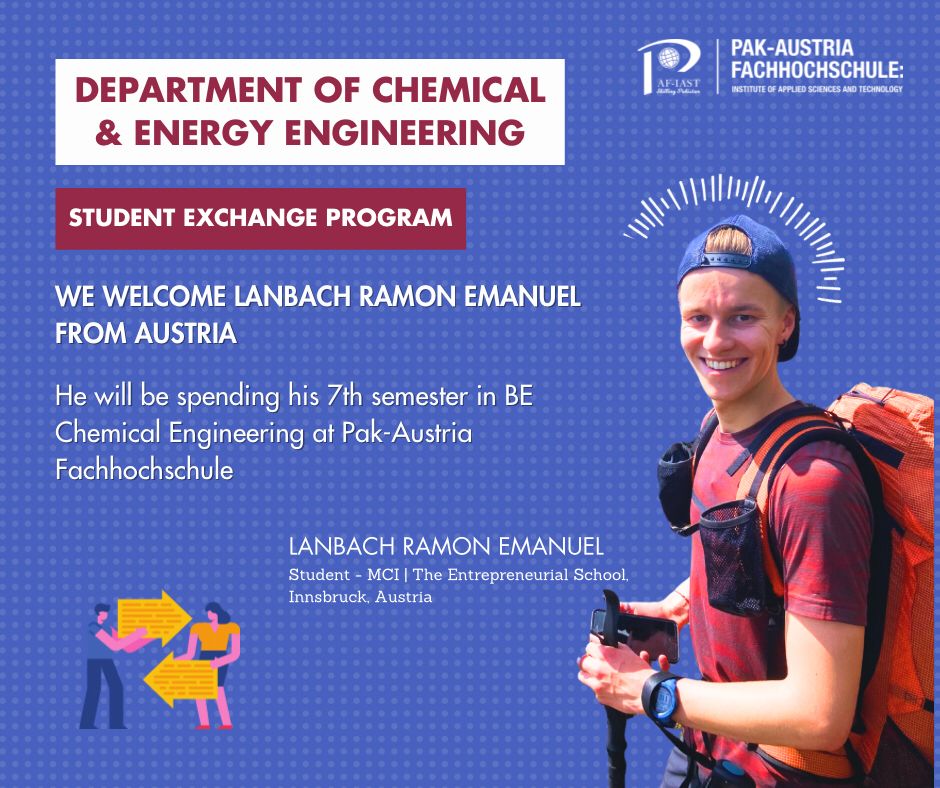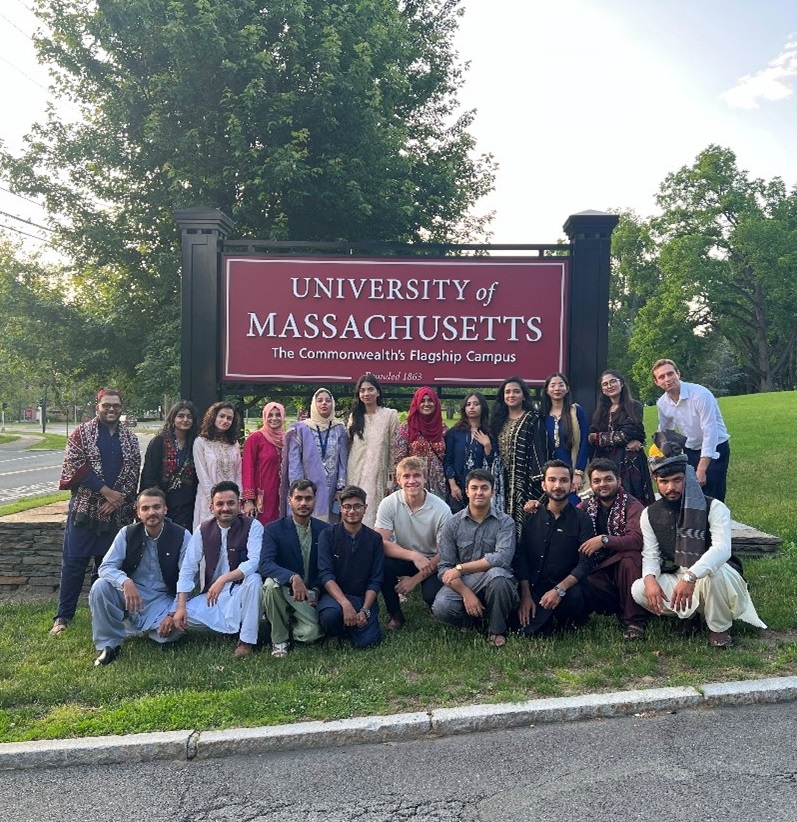The Department of Chemical and Energy Engineering has been established since 2020 to equip the students with recent frontiers of applied sciences and technologies. Through the strong collaboration with MCI, Innsbruck, Austria as academic partner, the department aims to produce graduates ready to perform in diverse professional arena. The department’s intent is to produce skilled manpower in the fields of process modeling & simulation, environment, energy & oil & gas with specific interest on product development and entrepreneurship. The academic programs are designed to equip students in diverse professional environments to meet applied learning needs both at national and international level.
Prof. Dr. Werner Stadlmayr
Head of Department
Department of Environmental, Process & Energy Engineering
MCI Innsbruck, Austria
Mag. Alexander Dumfort
Senior Lecturer
Department of Environmental, Process & Energy Engineering
MCI Innsbruck, Austria
Dr. Silvia Öttl
Senior Lecturer
Department of Environmental, Process & Energy Engineering
MCI Innsbruck, Austria
International Student Exchange: An Austrian student Lanbach Ramon Emanuel from MCI Innsbruck, Austria is joining BE Chemical Engineering program for one semester on student exchange program funded by MCI, Austria. Be a part of global exposure and cultural enrichment through our strong international academic collaboration with partner institutions in the Department of Chemical & Energy Engineering. Let’s bridge cultures and engineer a brighter future together through our internationalization opportunities.


Chemical Engineering student visited USA under SUSI student leadership program: Our brilliant student of Batch 20 in Chemical Engineering participated in Comparative Public Policymaking course at Institute for Student Leaders in United States during 2023 intake. The event at the University of Massachusetts, Amherst started from 15th June to 5th August 2023. She successfully completed her stay and learning by enhancing her leadership skills.
The purpose of the Chemical Reaction Engineering Lab is to provide practical experience and hands-on learning opportunities to the students to deepen their understanding of fundamental principles and concepts related to chemical reactions, reactor design, and optimization. The students will develop crucial skills in experimental techniques, data interpretation, and problem-solving, enabling them to apply their knowledge to real-world scenarios and contribute to the advancement of chemical engineering research and industrial processes.
The Separation Processes lab focuses on developing and understanding of theoretical concepts relating to separation processes. The students will be able to apply the separation concepts, and heat and mass transfer principles to different unit operations. In addition, mass transfer lab provides plently of oppertunities to learn practical aspects of mass transfer in engineering.
In Organic & organic chemistry lab, students will become familiar with the basic skills, techniques, and apparatus in chemistry. The experiments related to spectroscopy, chromatography, organic chemical reactions, salt analysis, elemental analysis and catalysis will be demonstrated and conducted.
In analytical and physical chemistry lab introduces students to physical and analytical chemistry techniques. The application of principles learned in class is reinforced by performing experiments in the lab. The students will be enlightened and educated to broad range of basic analytical and other techniques used in chemistry and chemical engineering.
Equipment List:
In chemical industries, various operations are assisted with heat addition and rejection by using a variety of heat exchangers and reactors whose performance is highly affected through heat transfer. Therefore, heat transfer lab is designed to familiarize the students with the various modes of heat transfer by applying its fundamentals through equipment.
Equipment List:
In fluid mechanics lab, fluids, and their flow behaviours are studied and observed. Pressure variations are calculated through gauges for compressible fluids when they flow through convergent-divergent nozzles. Various theoretical demonstrations of different laws of fluid mechanics are checked through lab equipment.
Equipment List:
In the thermodynamics lab, equipment is related to the basic laws and applications of thermodynamics like boiler, refrigeration unit, Joule-Thomson apparatus, and Boyle`s law apparatus. This lab not only allows students to have a thorough understanding of these principles but also develops the basic requirement of a chemical engineer, i.e., to cope with the wide variety of problems such as calculation of heat and work requirement of physical and chemical processes.
Equipment List:
This laboratory supports basic courses in machine tools and machining at the undergraduate level. The experiments to be performed in the laboratory are designed in such a way as to reinforce understanding of the basic principles and practical skills needed by students to visualize various phenomena encountered in different applications. The questions provided at the end of each experiment reinforce the students’ understanding, besides preparing them for viva-voce exams.
Equipment List:
Chemical process technology lab provides hands-on experience for industrial/ semi-industrial equipment. CPT lab is mainly focused on process and plant design, scale-up, etc. The students will utilize diverse scientific concepts from different subjects in one assignment/project, for instance, analytical chemistry, thermodynamics, heat and mass balances, unit operations, kinetics, process control, uncertainty calculations, sampling techniques, safety, and environmental aspects.
Equipment List:
The lab facility helps to design, simulate, and optimize different chemical engineering processes. ANSYS Computational Fluid Dynamics (CFD) Software used to predict the impact of fluid flows under different conditions during operations. HyperChem is also used for building new molecules, predicting their molecular mechanics and dynamics. ASPEN Engineering Suite (AES) is extensively used for designing Chemical Process Industries, optimization of existing and new process industries, economic evaluations, and feasibility studies of process industries. There are 50 workstations at the simulation laboratory.
Electrical Engineering Lab aims to provide basic knowledge of electrical equipment and skills to undergraduate students through various experiments. This lab is focused on the fundamentals of circuit analysis, voltage, current, sources, and Ohm’s law to resolve complex electric circuits. Also gives the PAF-IAST PROSPECTUS 2020 43 solutions for resistive circuits followed by complex elements, e.g., capacitors, inductors and operational amplifiers, circuits with DC sources, and circuits with sinusoidal sources